Table of Contents[Hide][Show]
Kathleen says: “I am unclear about net carbs vs total carbs. I eat a lot of veggies, which increases my total carbs to over 100 grams per day, but my net carbs are usually between 40-60. Should I focus more on the total or the net carbs eaten? I have been diagnosed with prediabetes, for several years now. Thank you!”
This is a fantastic question!
If you look around the low carb websites online, the Atkins diet, ketogenic diet, or low carb products like Atkins, you’ll see that oftentimes they use”net carbs.”
But what about for diabetes, is net carbs better than calculating your total carb intake?
That’s exactly what we’re here to workshop together now so you can get a better understanding about how total carbs and net carbs effect you and your blood sugar levels.
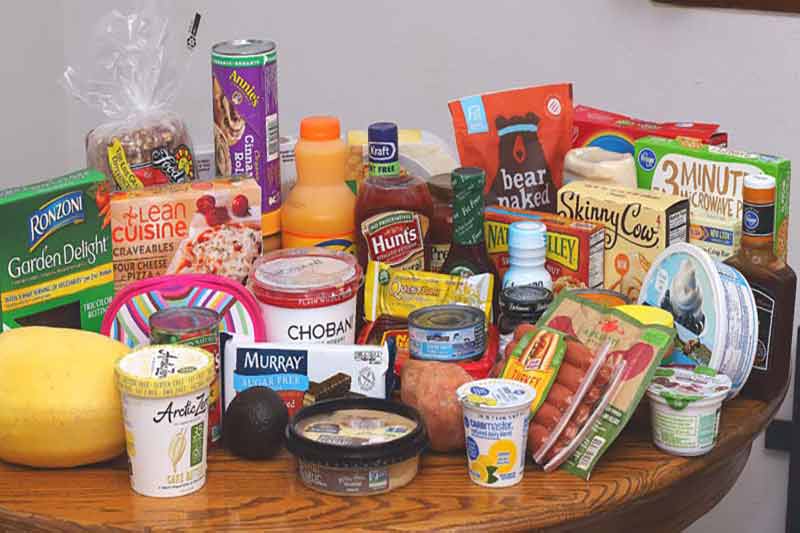
Net Carbs vs Total Carbs: What’s the Difference?
To explain it simply, total carbohydrates is obviously the total amount of carbs contained in any food item.
Whereas the net carbs removes certain elements from the total carb count to provide you with the “net effect” of those carb-containing foods on the body.
How to Determine Net Carbs
You can use this simple formula to calculate the number of net carbs in any given food:
Total carbs minus fiber = net carbs
Let’s break this formula down using an example.
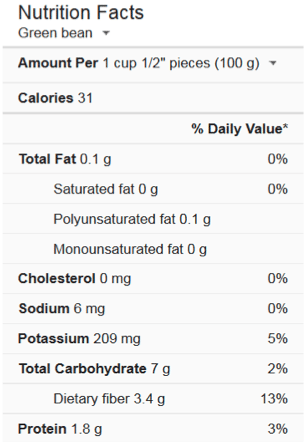
First, check out the nutrition facts label from a can of green beans. A serving of these beans contains 7 grams of total carbohydrates.
Now look a little closer at the label and you will notice that a serving of green beans also contains 3.4 grams of dietary fiber.
So if we plug these numbers into the formula, it looks like this…
7 g (total carbs) – 3.4 g (fiber) = 3.6 g (net carbs)
When you subtract the fiber content it “cancels out” some of the total carbs, and you’re left with the “net effect” of the food.
But… there is a bit more to it than that. So let’s look at fiber for a sec…
What’s the Deal with Fiber?
In short, fiber is the “indigestible” part of plant foods. Fiber isn’t digested and absorbed by the body so it contains no calories and it doesn’t raise your blood sugar.
When it comes to fiber, there are many different types to be found in various food sources:
Inulin. Found in artichokes, garlic, leeks, onions, asparagus, chicory root, wheat and rye.
Resistant starch. Found in cooked and cooled rice and potatoes, beans and legumes, grains, seeds and green bananas.
Pectin. Mainly found in apples, oranges, citrus peels, carrots, cherries and apricots, along with smaller amounts in other fruits and berries.
Oligofructose. Like inulin, this fiber is also found in artichokes, garlic, leeks, onions, chicory and asparagus.
Fructooligosaccharides. Found in a wide range of fruits and vegetables but particularly bananas, onions, garlic and asparagus.
Cellulose. Forms the structure of most vegetables so eating an abundant variety is important.
You won’t hear of these types of fiber much. Instead, you will often hear the terms “soluble fiber” and “insoluble fiber.”
Soluble fiber: turns into viscous gel-like substances that slow the rate of digestion, including the absorption of sugar/ glucose.
Insoluble fiber: forms the structure of most plants and it’s mostly resistant to digestion. This means it forms a lattice work in our gut and moves along our digestive tract, adding weight to waste material and assisting with digestion, and pooping.
Advantages of a high fiber diet:
- Better blood glucose and A1c control
- Increased weight loss
- Decreased inflammation
- Lower insulin response and improved insulin sensitivity
- Promote healthy gut bacteria
KEY POINT: Fiber does not really become digested, or rather, absorbed by the body. Therefore, it “cancels out” some of the carb content in foods.
Downfalls of Low Carb “Products”
You’ll often see lots of low carb food products packed with “man-made” fiber and “sugar alcohols.” And many of these products go ahead and claim a 25 gram food product has only 1 gram net carbs.
There are two dangers here:
- Man-made fibers: while “man-made” fibers are still technically fibers, they certainly aren’t the same as natural plant fibers. A processed fiber is still a processed “man-made” fiber so while they will bring a “processed” foods net carbs down, you’re still not consuming the types of foods you should be – namely: natural whole food sources.
- Sugar alcohols: most food manufacturers subtract the entire amount of sugar alcohols from the total carb count, which is actually inaccurate. This means you could consume a low carb food product that may in fact impact your blood sugar levels much more than you expect.
So let’s take a look at sugar alcohols more closely…
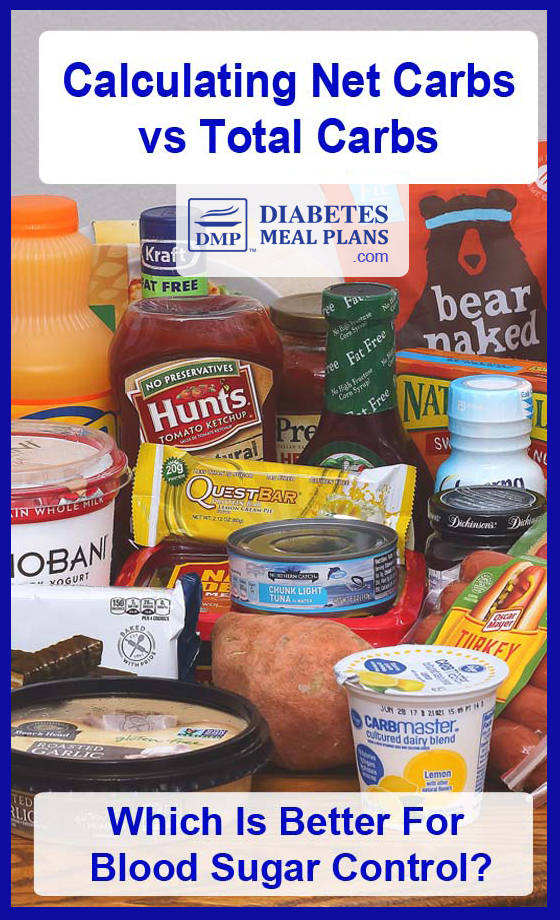
Beware of Sugar Alcohols
Sugar alcohols are both confusing and annoying. For one thing, they aren’t sugar. For another, they aren’t alcohol.
They are compounds similar in structure to sugar and taste sweet to varying levels, but are not completely absorbed and therefore, do not have the same degree of impact on blood sugar.
But that’s the catch: some sugar alcohols have no impact on blood glucose whereas others have almost the same impact as sugar itself. And unfortunately, when you look at the nutrition facts label, all of these sugar alcohols are lumped into the same category and manufacturers get away with subtracting all of them from the carb count, even when it’s not accurate and could in fact be harmful to people!
For example, erythritol has zero calories and a glycemic index of zero. Whereas xylitol has 2.4 calories per gram and a glycemic index of 12, which will certainly still impact blood glucose to some degree.
Here’s the sugar alcohol shortlist (C=calories, GI=glycemic index, IE=insulin index):
- Erythritol – C: 0-0.2, GI: 0, IE: 2
- Xylitol – C: 2.4, GI: 13, IE: 11
- Sorbitol – C: 2.6, GI: 9, IE: 11
- Mannitol – C: 1.6, GI: 0, IE: 0
- Isomalt – C: 2.0, GI: 9, IE: 6
- Lactitol – C: 2.0, GI: 6, IE: 4
- Maltitol – C: 2.1, GI: 35, IE: 27
- Polyglycitol – C: 3, GI: 39, IE: 23
All sugar alcohols are low glycemic index, as anything under 55 is considered low – though of course, the lower the better. The insulin index refers to how the sugar alcohols impact insulin levels. Much like the glycemic index, the higher the number, the more of an impact the sugar alcohol has.
So in terms of carb counting, what are you to do about sugar alcohols then?
KEY POINT: The University of California, suggests that you subtract only half of the grams of sugar alcohol from the total carbohydrate, not the entire amount as many food manufacturers do. So, if you buy a low carb product, be cautious, as they will likely subtract the entire amount from the product and “claim” a lower carb count.
What About Calculating Sugar?
Some people do get confused about the whole sugar and carb counting ordeal. But when it comes to gaining good control, counting sugar is not really important.
Why?
Because sugar is a subcategory of the total carbohydrate count. What that means is that the sugar is already factored in when you check the total carbs.
And one thing about nutrition labels is they do not separate “added” sugar from the natural sugar found in whole foods like vegetables. For instance, 1 cup chopped broccoli contains 1.5 grams of sugar but it’s clearly not “added” sugar, nor is it bad for your health.
Of course, you want to stay away from “added” sugars. And the only way to determine this is to assess the ingredients list of a food product, as you can’t really tell from the nutrition label.
Since sugar is a subcategory of the total carbs, it’s important to remember that ALL carbs (with fiber being an exception) will break down during digestion and convert to glucose/sugar, and therefore raise your blood sugar levels to some degree.
KEY POINT: Sugar content is a subcategory of total carbs on nutrition labels and does not distinguish between “added” sugar and natural sugars. Therefore, using the total carb count is best.
Total Carb vs. Net Carbs Examples
Now that you’re familiar with fiber, you can use the formula to calculate the net carb values of whole foods. To find nutrition data for foods, you can search the USDA Food Database or FatSecret.
Once you know the nutrition details of a food, just plug in the simple formula to calculate the net carbs (Formula: total carbs minus fiber = net carbs).
Here are a few examples (the bold number is the amount of net carbs):
- Broccoli (1/2 cup): 5.6g – 2.6g = 3g
- Avocado (1 whole): 17g – 6.5g = 10.5g
- Chia seeds (1 oz ): 12g – 10g = 2g
- Whole Wheat Pasta (1/2 cup): 18.6g – 3.26g = 15.4g
- White Rice Pasta (1/2 cup): 22g – 0.9g = 21.1g
- Oatmeal (1/2 cup ): 13.5g – 2.2g = 11.3g
- Banana (1 whole): 27g – 3.1g = 23.9g
- Lentils (1/2 cup ): 19.9 g – 7.8 g = 12.1g
- Strawberries (1/2 cup ): 5.5g – 0.2g = 5.3g
- Apple (1 whole): 25g – 4.4g = 20.6g
- Almonds (1/2 cup ): 10g – 5.5g = 4.5g
- Blackberries (1/2 cup): 7g – 4 g = 3g
Processed Foods: Total Carb vs. Net Carbs Examples
Now let’s look at a couple of processed food labels.
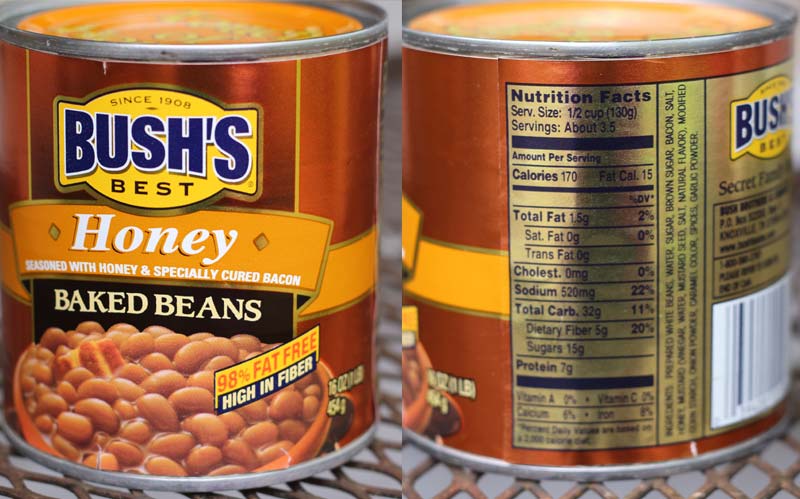
One serve (1/2 cup) of these baked beans is 32 grams total carbs and 5 grams fiber, which equals 27 grams net carbs. No, this is definitely not a low carb food.
When you turn over to the ingredients list you will see there are 3 forms of “added” sugar in the product: white beans, water, sugar, brown sugar, bacon, salt, honey, mustard (vinegar, water, mustard seed, salt, natural flavor), modified corn starch, onion powder, caramel color, spices, garlic powder.
Remember, you don’t have to count sugar but you should always read nutrition labels to determine the quality of a food.
Let’s take a look at another low carb food product example: Atkins bars.
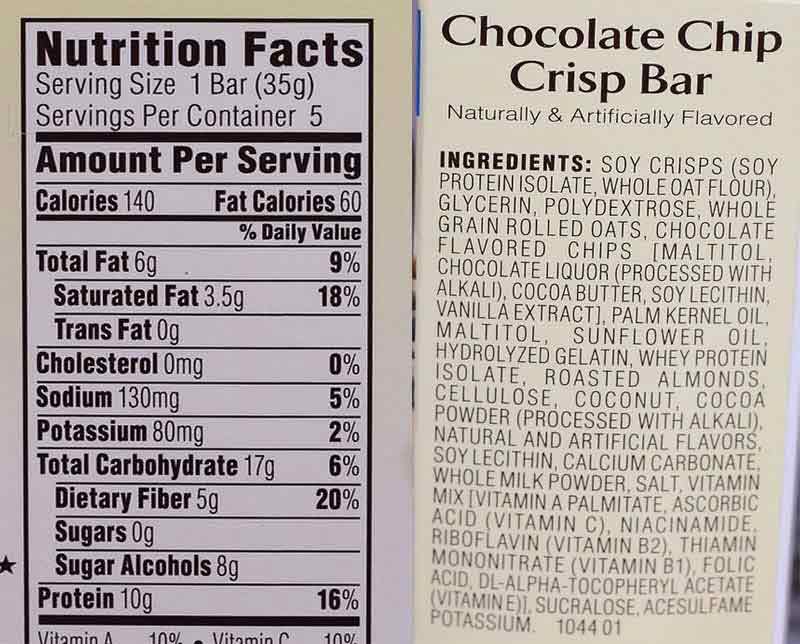
First, check out that long list of ingredients. A long list like this generally indicates a low quality food product. You will also notice ‘maltitol’ (a sugar alcohol), along with sucralose and acesulfame potassium (both artificial sweeteners).
Atkins market their product as “Net Carbs: 4 grams.”
So what they have done is take the total carbs and subtracted the fiber (5 grams) AND sugar alcohol (8 grams). But, what we just learned above is that only HALF should be subtracted, which would actually make this product 8 grams net carbs.
The maltitol this product uses has one of the highest glycemic indexes of 35, which means it will impact blood sugar to some degree. And artificial sweeteners can also impact blood sugar as well, along with having several other adverse effects on your health.
So the message here is: if you eat this food thinking it won’t influence your blood sugar, think again! You might be surprised that it has a bigger impact than expected.
KEY POINT: Don’t trust ‘front-of-pack’ product labeling. Be a detective and always read the ingredients list and nutrition label.
Net Carbs vs Total Carbs: Pros and Cons
PRO: possibly eat a higher fiber diet.
At the very top, Kathleen said: “I eat a lot of veggies, which increases my total carbs to over 100 grams per day, but my net carbs are usually 40-60”
In this instance where Kathleen is obviously eating lots of natural whole food sources that are beneficial to her health, this would be acceptable because anything under 120 grams per day total carbs is technically considered ‘low carb.’ And she is consuming 40 to 60 grams of natural plant fiber, which also has huge benefits, including better blood glucose and A1c control.
Counting net carbs can be used as a method to tease out the carb-heavy foods that are completely off limits from the nutrient-dense vegetables and fruits that will nourish your body while keeping your blood sugar stable.
CON: possibly leads to eating more low carb “products”
But… if you’re eating lots of low carb “products” that are filled with “man-made” fiber and artificial sweeteners, preservatives, colors, etc. Well, you could technically argue that you’re still eating low carb. But, you’re not really going to be eating a healthy low carb diet.
If you eat a lot of processed and packaged foods, low carb or not, you’re basically eating a junk food diet. And quite simply, all those “man-made” ingredients just don’t have the same net effect on your metabolism as natural whole food sources do.
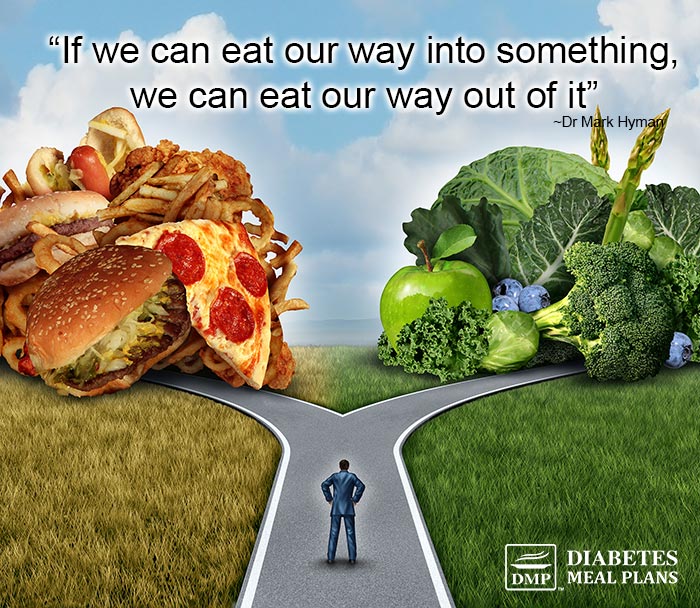
PRO: more food options
In a sense, a carrot isn’t technically a “low carb” food. One carrot contains 6.4 grams of total carbs, which isn’t as low as something like cabbage, which has just 2 grams per half cup shredded.
But that same carrot also provides 2.3 grams of fiber, reducing the ‘effective carbs’ to just 4.1 net carbs.
Obviously carrots are a whole food source that also provides ample nutrients and compounds such as carotenoids. Therefore, even though it is a little higher in carbs than other non starchy vegetables, it doesn’t make sense to exclude carrots from your diet.
So in a sense, calculating net carbs can open up your food options.
CON: net carbs not as accurate as total carbs
Because we can’t truly calculate the effect of the fiber and additional components of foods on blood sugar, A1c and insulin, overall, net carbohydrate counting is not as accurate as total carbs.
When you calculate total carbs you’re not going to have any discrepancies to counter for – sugar, sugar alcohol, fiber – it’s all going to be factored into your total carb count.
So What’s the Final Verdict: Should You Calculate Net Carbs or Total Carbs?
It can be a bit confusing because there is no clear and definitive answer on this. For the most part, research studies use total carbs, which suggests we should too.
However, we do know that the fiber component isn’t digested so really the net carb count is the amount of ‘digestible’ carbs – the net effect of the carbohydrate foods you eat.
The best answer is you can use both calculations to determine your daily carb intake.
In terms of total carb intake, anything under 130 grams per day is considered low carb and will provide benefits. But the sweet spot for better blood sugar and A1c control seems to be around 50-80 grams total carbs per day.
And, you can also calculate net carbs to determine how much dietary fiber you’re eating. If you’re getting all (or at least most) of your fiber from natural food sources such as non starchy veggies, nuts and seeds, then having a total carb intake of 50-80 grams per day and a net carb intake of 20 to 60 just gives you another measurement of the healthiness of your diet.
Remember, the reason you calculate any numbers in the first place is so that you can gain better control of your diabetes/ prediabetes.
Numbers simply give you things to evaluate so you can tweak and change habits and improve your numbers and your health, which means both net carbs and total carbs can be useful measurements.
Please pin, tweet or share this info to help others. Thanks!

Serena Kidder
Thank you so much, I have gestational diabetes and was struggling with what to eat. This is so helpful
Dr Jedha
That’s great to hear Serena – be sure to poke around, there is lots of info here to help!
Irma
I found your article highly informative. I knew how to calculate net carbs (which is what I base myself on), but was under the impression that ALL alcohol sugars were not processed by our bodies and, therefore, okay. Now I know which ones to look out for. I’ve been following a low-carb diet since March. I’ve lost 25 pounds, stayed off diabetes meds, and got off meds for hypertension. I’m sure your article will help others do the same!
Merri Griffin
I am so totally confused. All I want to know is do I use total carbs or net for type 1 diabetes? One or the other.
Jedha: Nutritionist (MNutr)
Focus on total carbs Merri.
Kim
Would you recommend total or net carb counting to a bariatric patient?
Jedha: Nutritionist (MNutr)
Both are helpful Kim so I would suggest you use both. Counting total carbs will provide an overall snapshot of your intake, but you also want to be eating plenty of fiber so tracking that and calculating net carbs provides another picture of how healthy your diet is. Most importantly, stick to whole foods.
Sarah W.
Thanks for the article! To make sure I understand the gist, is it fair to say that if the fiber you consume derives from natural whole foods (veggies, beans, etc.) and is thus insoluble fiber, it’s fine if you count net carbs and they are around 80-100 grams per day? I understand that lower is better, say 20-80, but I feel that’s not practical for me because I eat a mostly plant-based diet.
Emily - Dietitian (MS, RD)
A “low carbohydrate” diet is considered anything under 130 grams per day, although as you point out, most of our members find anywhere between 50-80 grams of carbs per day is the sweet spot.
Recognize that foods are rarely 100% insoluble fiber or 100% soluble fiber- they contain a unique balance of each.
To answer your question simply- yes. If you are primarily eating a wide variety of vegetables, nuts, seeds, and some fruit than you will have a slightly higher total carb intake, compared to someone who follows more of a meat based diet. As long as your total carbs are under 130 grams per day, and you’re able to maintain good control of your sugar levels, then you are probably doing just fine!
Susan
Thank you thank you for simplifying. Mystery solved.
David Parker
I am interested to hear what your take on dextrin based fiber intake is regarding the decrease of negative impact alcohol has in the body on a low carb (<20g/day) diet. Does the dextrin offset the carbs? It IS the holiday season after all!!
Jedha
Unfortunately I’m not overly familiar with dextrin based fiber so I can’t comment unless I do more research on it. But if you’re looking to offset alcohol by increasing fiber, I highly doubt it’s a good strategy. We did write some info on the best alcoholic drinks to choose over here – planning ahead may be a better strategy.
nancy
this is ridiculously hard to do and understand.
Jedha: Nutritionist (MNutr)
It’s actually not Nancy. Like I said to Jeri above, we do provide all the information to explain things, but it’s really quite simple. You can count either net carbs or total carbs, or both. And to get a net carb count, you just subtract the fiber content from the total carb content. And just be wary of sugar alcohols, manufacturers often subtract 100% of the amount, so add 50% back.
JoAnn Booth
Good Morning Jedha,
I’m JoAnn Booth I used you program after I found out I was Type 2. It has been over a year and with your program and the great information in it ,I have been able to keep my A1C at a 6. Thanks for all your help.
JoAnn
Jedha: Nutritionist (MNutr)
Yes JoAnn, I remember you well. I am so happy to hear that you’ve maintained your great changes – congrats! You’ve just made my day. :)
Susie Gray
Hi all, I have been following you and trying your advice {not strict but doing better every day.] Just want to tell you of extremely positive results at my last Dr. visit. In three months time I have lost fourteen lbs. and have dropped my A1c from 7.1 to 6.3. I am so happy and pleased to have found something that is helping me. I have been a diabetic for about ten years now and take no meds. Stricktly diet controlled and had been struggling the last year with my A1c steadily going up and nothing I had done in the past seemed to be working. I can’t thank you enough for all that you do and this is the way I will continue. It was hard at first but is getting easier every day, especially with this positive of results this quickly. Thank you from the bottom of my heart Susan Gray.
Jedha: Nutritionist (MNutr)
Thank you for sharing Susie – so fantastic to hear you’re getting results. Congrats!! We look forward to hearing more from you in future.
Colleen
Thank you for so clearly explaining this. This will help as I learn more about what I have to do as a diabetic.
Paola Ortiz
After reading your article on net cars vs total carbs, I feel more informed to make the correct choices in different food items. Very informative! Thank you!
Jedha: Nutritionist (MNutr)
Thanks great the hear Paola.
Anthony Armenti
Your explanation of net carbs vs total carbs was fantastic and very informative.
Jedha: Nutritionist (MNutr)
Thanks for your feedback Anthony – glad you enjoyed it!
Mary
I’m “pre” diabetic have been for many many years. What is a healthy amount of carbs to be ingested daily to help me lose weight. My doctor wants me to be on a low carb/high fiber diet. I’m already on a low salt diet because of hypertension. I weigh in the 190’s and varies from 190 to 197 as a rule of thumb. I just can’t seem to break out of the 190’s. I would appreciate your helpful information to get me over the hump to weight loss. I have the book, “The Corinne T. Netzer Encyclopedia of Food Values” and it was invaluable to me when keeping tract of my eating before my kidney transplant. So if I have a healthy carb intake I can keep tract of that too to help me lose weight. Thank you in advance for your help.
Jedha: Nutritionist (MNutr)
Hi Mary, we encourage people to follow a low carb diet because research has shown it does produce excellent results for blood sugar, A1c, weight loss etc. Low carb is anything under 130g per day. But we find staying under 100g is best (and is a great place to start. But if you can lower your carbs even further (50-80g), you’ll often get better results. Here’s some more info you might find helpful.
Ken Williams
I enjoy reading your articles, they have help greatly with getting control of my diabetes. There is so much information on the internet and many different opinions. Not all lead to a healthy diet. I really appreciate the simple explanation of content and attention to food quality. I suppose this gets lost in the fog of nutrition today.
Again, thanks for such an excellent article.
Ken
Jedha: Nutritionist (MNutr)
Thanks Ken – glad you find it helpful. Food quality is definitely a BIG priority!
Jeri
This is so confusing and too much to try to remember. Can’t this all be simplified?
Jedha: Nutritionist (MNutr)
Hi Jeri, we do provide all the information to explain things, but it is actually quite simple. You can count either net carbs or total carbs, or both. And to get a net carb count, you just subtract the fiber content from the total carb content. And additionally, it is always best to choose quality whole foods over packaged, processed products.
Tom L
I thought the article explained in detail and summary very well. Helped me understand it better.
Read the label and think about your overall diet.
Emily - Dietitian (MS, RD)
Glad you found the information useful!